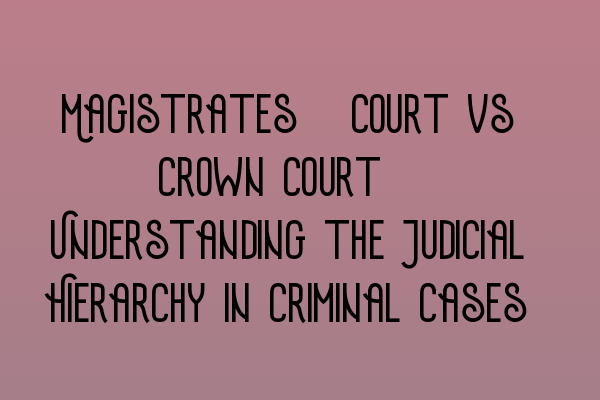Magistrates’ Court vs Crown Court: Understanding the Judicial Hierarchy in Criminal Cases
When facing criminal charges, it is crucial to have a proper understanding of the judicial hierarchy in the UK. Two significant courts involved in criminal cases are the Magistrates’ Court and the Crown Court. Each court plays a distinct role in the criminal justice system, and knowing the key differences between them can greatly impact the outcome of your case.
Magistrates’ Court – The First Step in the Process
The Magistrates’ Court is the first point of contact for most criminal cases. This court handles the initial hearings, known as summary offences, and deals with minor crimes such as common assault, shoplifting, and driving offenses. The Magistrates’ Court is presided over by magistrates or district judges who make decisions based on the evidence presented. They may impose fines, community service, or custodial sentences for less serious crimes.
If you are facing charges that fall within the jurisdiction of the Magistrates’ Court, it is important to seek legal advice from an experienced criminal solicitor. They can guide you through the process, build a strong defense, and ensure your rights are protected during the proceedings.
For those preparing for the SQE 1 exam or interested in testing their knowledge of criminal law, SQE Criminal Law & Practice Law UK offers practice exam questions to help you assess your understanding.
The Crown Court – For Serious Criminal Offenses
Unlike the Magistrates’ Court, the Crown Court deals with more serious criminal offenses. This court typically handles cases where the defendant has chosen to plead not guilty to charges referred to as “indictable offenses.” Indictable offenses include serious crimes such as murder, rape, robbery, and fraud. In the Crown Court, the case is heard before a judge and a jury, providing a more formal setting for the trial.
The Crown Court offers the opportunity to present a full defense, including cross-examination of witnesses and expert testimonies. It is essential to have the expertise of an experienced solicitor or barrister specialized in criminal law to navigate the complexities of Crown Court proceedings. They can gather evidence, build a strong defense strategy, and represent your best interests throughout the trial.
If you are preparing for the SQE 1 mocks or SQE 2 exams, SQE Criminal Law & Practice Law UK offers comprehensive preparation courses to enhance your knowledge and increase your chances of success.
The Appeal Process
If you are dissatisfied with the decision made by the Magistrates’ Court, you can choose to appeal the ruling. Appeals for both Magistrates’ Court and Crown Court cases are usually heard in the Crown Court or the higher courts, such as the Court of Appeal. The appeal process provides an opportunity to challenge the decision based on legal errors, improper procedures, or new evidence that was not previously available.
To ensure a successful appeal, it is crucial to seek legal advice from a solicitor or barrister specialized in appellate advocacy. They can assess the grounds for appeal, navigate the complex legal requirements, and present a compelling case before the higher courts.
For a detailed overview of the SQE 1 preparation courses offered by SQE Criminal Law & Practice Law UK, visit their website for more information.
Conclusion
The Magistrates’ Court and the Crown Court play distinct roles in the UK judicial system. Understanding the differences between these courts is crucial when facing criminal charges. Seeking legal advice from a qualified solicitor or barrister who specializes in criminal law can greatly impact the outcome of your case, whether it is handled in the Magistrates’ Court or progresses to the Crown Court. Additionally, for those preparing for the SRA SQE exams, SQE Criminal Law & Practice Law UK offers comprehensive preparation courses and a range of practice materials to enhance your understanding and increase your chances of success.
If you require legal representation or expert guidance for your criminal case, contact SQE Criminal Law & Practice Law UK today to get the support you need.
Related Articles:
